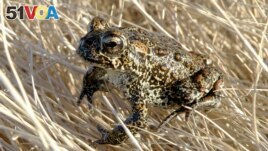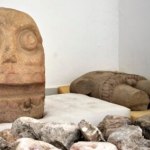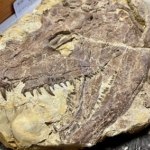11 December 2022
A power center that will create electricity by pumping hot water from the earth sounds like a good idea. The company that hopes to build the power center in a part of western Nevada says it will create electricity without creating very much pollution.
But the U.S. government's Fish and Wildlife Service (FWS) says the project will greatly change the area where a very small toad lives. A toad is a small animal that looks like a frog but has dry skin and lives on land.
The Dixie Valley toad lives in a small area about 160 kilometers from Reno, Nevada. It is the only place it is known to exist on Earth.

A Dixie Valley toad sits atop grass in Dixie Valley, Nev., on April 6, 2009. The tiny Nevada toad at the center of a legal battle over a geothermal project has officially been declared an endangered species. (Matt Maples/Nevada Department of Wildlife via AP, File)
Because of the power center plans, the FWS in April temporarily moved the toad from its "threatened" list to its "endangered list." Animals on the endangered list are at a much higher risk of going extinct, or no longer existing.
Last week, the FWS finalized that temporary move. It officially declared the Dixie Valley toad an endangered species.
In its final ruling, the FWS said it was concerned that the power center will take the hot water from the ground before it can reach the surface naturally. The place where hot water comes up through the ground is a hot spring. The toads can only live on land that stays warm and wet because of the water from the ground.
FWS experts do not believe the toad will be able to adapt, or get used to, to the new environment. "These conditions could result in the species no longer persisting," or living, the FWS wrote.
The FWS also noted that the power project will change the conditions too quickly to give the toad a chance to adapt.
An environmental advocacy group called the Center for Biological Diversity said it was pleased with the FWS decision to protect the toad.
Patrick Donnelly is the group's director for the area that includes Nevada. He called the decision an "essential step to prevent the extinction" of a special animal.
Donnelly agreed that clean energy is important in fighting the climate crisis. "But," he said, "it can't come at the cost of extinction."
The power company behind the project is called Ormat Technology. Its original plan called for building two power plants that would produce 60 megawatts of electricity.
Environmental activists took legal action to block the building of the power plant late last year. A Reno judge is still considering the case.
In October, Ormat asked the judge to put the case on hold while it developed a new plan to build just one plant that would produce only 12 megawatts of power.
Ormat's Vice President is Paul Thomsen. He said the company's plan to create the power center will "support the fight against climate change" and is in line with U.S. President Joe Biden's plans to create clean energy.
Thomsen said the FWS ruling was not surprising, considering the emergency move to protect the toad last April. He also said the ruling does not change what Ormat is already doing to reduce and avoid possible harmful effects on the toad.
I'm Dan Friedell.
Dan Friedell adapted this story for VOA Learning English based on a report by the Associated Press.
___
Words in This Story
pump –v. to force air or liquid out of something
persist –v. to continue to happen or exist
species –n. a group of animals or plants that are similar
advocacy –n. the act of supporting or asking for something
essential –adj. important or very basic












